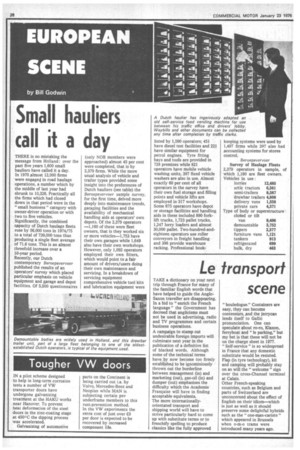Le transport scene
Page 28

If you've noticed an error in this article please click here to report it so we can fix it.
TAKE a dictionary on your next trip through France for many of the familiar English words that have helped to guide the AngloSaxon traveller are disappearing. In a bid to "enrich the French language" the Government has decreed that anglicisms must not be used in advertising, radio and TV programmes and certain business operations.
A campaign to stamp out undesirable foreign imports will culminate next year in the publication of a definitive list of blacked words. Although some of the technical terms have by now become too firmly established to be ignominiously thrown out the borderline between management (in) and marketing (out), gas-oil (in) and dumper (out) emphasises the difficulty which the Academie Francaise will have in finding acceptable equivalents.
The more internationallyorientated transport and shipping world will have to strive particularly hard to come up with substitute terms or to frenchify spelling to produce classics like the fully approved " bouledogue." Containers are easy, they can become conteneurs, and the jerrycan lends itself to Gallic pronunciation. One can speculate about ro-ro, Klaxon, ferryboat and "le parking," but my bet is that these will not be on the charge sheet in 1977. " Self-service " is so widespread in France that any domestic substitute would be resisted. Flap (in tyre technology), kit and camping will probably stay on as will the " welcome" sign over the cross-Channel terminal at Calais.
Other French-speaking countries, such as Belgium and parts of Switzerland are unconcerned about the effect of English on their idiom—which is just as well as it should preserve some delightful hybrids such as the " one-man-cariste " which appeared in Brussels when o-m-o trams were introduced many years ago.
















































































